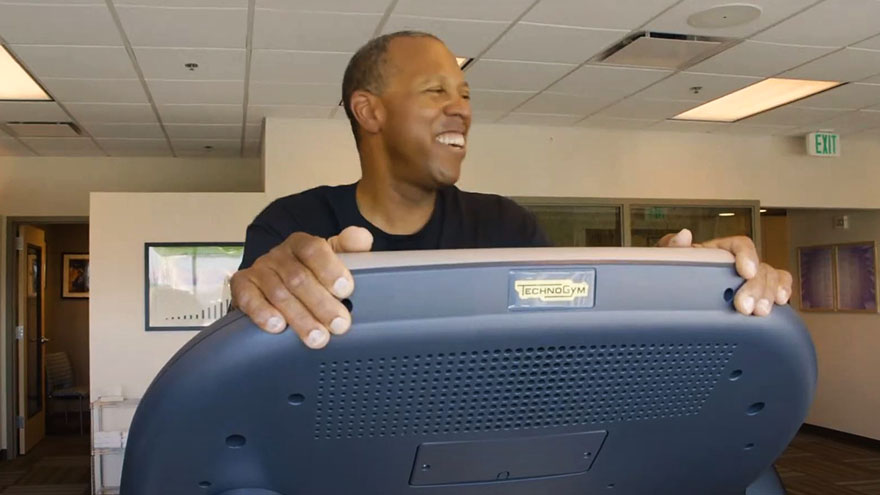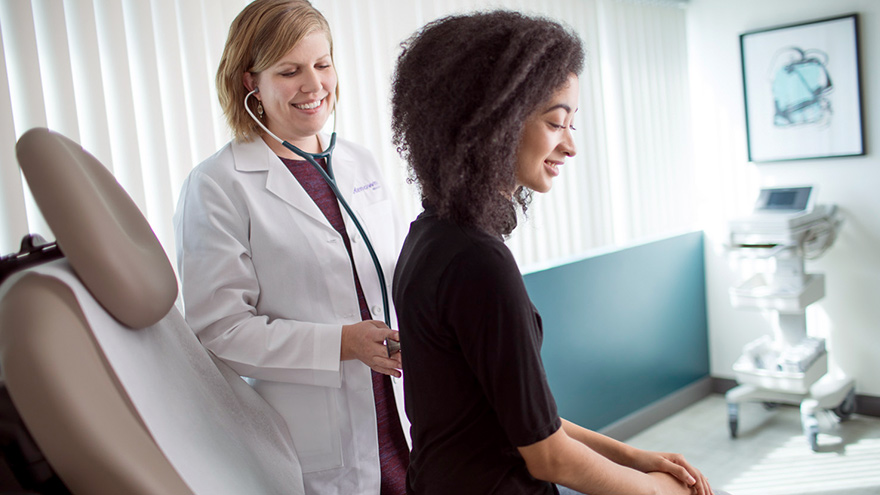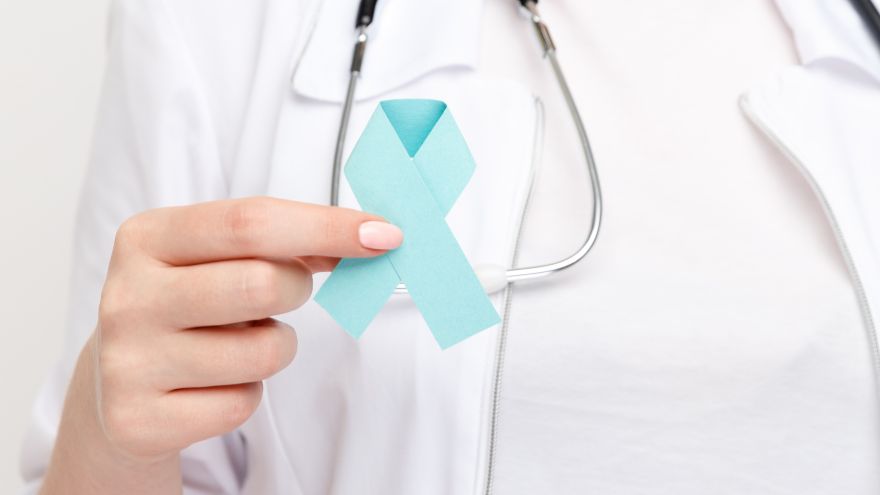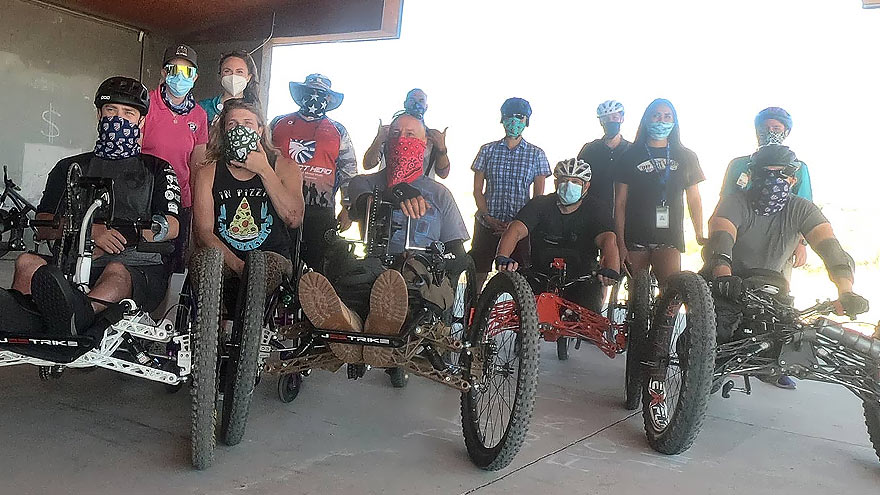Search
-
Perseverance and Physical Therapy Help UNR Student Walk Again
University of Nevada, Reno student Khoa Le was paralyzed in 2010 after a longboarding accident. Through physical therapy, a positive attitude and sheer will, Le is walking again. This weekend, Le will walk across the commencement stage to accept his college diploma. “Walking around on my own power is just the greatest feeling,” says Khoa Le, a senior at the University of Nevada, Reno. Just after finishing summer school at the university in July 2010, his whole life changed within seconds after stepping on a longboard skateboard for the first time. He lost control of the board and hit the curb, causing paralysis on the left side of his body. His journey to recovery began at Renown Health Physical Therapy & Rehab. His physical therapist, Dina Barry, says he never complained once in four years. “I started seeing Khoa in April 2011, and we worked for four years together,” says Barry, a lead physical therapist at Renown. “Everything I’ve ever asked him to do, he does. Le is a hard worker, is continuously optimistic and smiling, and I think that is why he’s accomplished what he has.” Le plans to pursue a career as an information systems manager.
Read More About Perseverance and Physical Therapy Help UNR Student Walk Again
-
Going the Distance to Get Heart Healthy
After having a heart attack, a Mammoth resident travels to Reno to complete rehab. He’s already lost 15 pounds and gained a healthier outlook on life. Eric Smith travels from his home in Mammoth Lakes, Calif., to Reno twice a week to participate in Renown Health’s Healthy Heart Program. “Living in Mammoth, it’s a three hour drive for me up here. Well, it’s my life or it’s a drive,” says Healthy Heart Program participant Eric Smith. The Mammoth Lakes, Calif., resident travels to Reno twice a week to participate in the 72-session program. which includes heart-healthy classes, exercise sessions and cooking demonstrations. “The cardiac rehab program here is excellent,” Smith says. “It is the only program that I am aware of that combines nutrition and exercise together. What’s the point of exercising to get your heart strong if you are still eating poorly and not educating yourself on that?” Smith’s heart issues began when he was 46-years-old. He received an angioplasty, which is a stent to hold a coronary artery open. Two years later, Smith had a heart attack and was flown to Renown Regional Medical Center for emergency bypass surgery on four arteries to allow blood to flow to his heart more freely. An avid skier, ski racing coach and tile setter, Smith admits that it is sometimes difficult to eat right when you’re on the go in a tourist town. Since starting the cardiac rehab program, Smith says he is feeling more optimistic on making lasting lifestyle changes after meeting other people who are going through the same challenges, like food cravings and trying to get stronger. “The big thing is getting educated on food,” says Smith, who has swapped out heavy breakfasts for whole grains and fruit, and steak dinners for baked fish. In just a few months of starting the program, Smith lost 15 pounds. He looks forward to passing along what he’s learned to his friends. “Everybody benefits from this program, especially if you have experienced a heart attack,” Smith says. “But if you don’t have those issues, you can still get the benefits from eating healthier.”
-
Book Ahead to Make Urgent Care More Convenient
How do you take the waiting game out of your Urgent Care visit? Book ahead! Here’s how this convenient service can help you schedule your appointment and see updated wait times at area urgent care facilities. We’ve all been there, done that: It’s after hours, you need to see a doc, and urgent care is slammed. Renown now offers a convenient option that will enhance your experience. Here’s How Book Ahead Works: From your phone or computer, you can check urgent care wait times around our region. This lets you see if the urgent care by your office is busier than the one closest to home — which may help your planning. Through Book Ahead, you can join the line at a specific urgent care just as you would in person. This allows you to stay home or at work as long as possible so you are more comfortable. Book Ahead When and Where to Receive Care We have many choices when it comes to our medical care. Should you visit a doctor’s office, urgent care, emergency care or make a Virtual Visit? It’s important to know which choice is right for your situation or condition. We asked Luis Palacio, M.D., with Renown Urgent Care to explain the differences and how to make your visit as smooth as possible. If you have been experiencing flu-like symptoms for less than 48 hours, call your doctor’s office. They can then determine if you can be treated with a prescription antiviral medicine. Visit urgent care or the emergency room only if you are unable to eat or drink anything and may be dehydrated, have a fever over 102.5 degrees F, or are experiencing shortness of breath. You can use Renown’s Virtual Visits videoconference service for flu-like symptoms so that you don’t need to leave the comfort of your home and you reduce the risk of spreading the virus to others. Virtual Visits allow you to see an urgent care provider from your home or office using a cellphone, computer or tablet with video capabilities. It is open from 8 a.m. to 6 p.m. Monday through Friday, and 9 a.m. to 4 p.m. Saturday and Sunday. How Do You Book Virtual Visits? Go to Virtual Visits to get started. Here, you’ll learn what virtual check-in is all about: It allows you to stay where you are and receive text notifications once a care provider is almost ready to see you. Click, join a line, and we will ask you some questions about your symptoms. This allows us to make sure you don’t need to call 911 or go to the ER. Reasons to visit the ER include stroke, chest pain, severe shortness of breath, uncontrolled bleeding, seizures and severe allergic reaction. If you answer “no,” you will see the wait times for each urgent care location. If you need to get in right away, you can select the location with the shortest wait time. Or, if time is not an issue and you’d prefer to stay closer to your home or office, you can select that location. Once you’ve selected a location, you input your cell number, name and number of patients. As your appointment gets closer, urgent care will text you with updates on timing. When you get the text message, you can choose to get “more time” and have your appointment pushed back, or tell them you’re ready to be seen and on your way. Learn more about how to Book Ahead at Renown urgent care below.
Read More About Book Ahead to Make Urgent Care More Convenient
-
Powerlifting through MS Diagnosis
When Tabitha Cox received a diagnosis of multiple sclerosis (MS), she was in shock, denial and felt that she was too strong for something like this to be happening to her. As the disease progressed, Tabitha realized she needed to do what she could to stay as healthy as possible. “I heard, ‘You have a quarter-size lesion on your brain,'” recalls Tabitha Cox. “At that moment, that was literally all I heard come out of her mouth.” Tabitha’s official diagnosis was multiple sclerosis (MS), an unpredictable, often disabling disease of the central nervous system that slowly debilitated her mom. “I was numb,” says Tabitha. After her diagnosis, Tabitha went on with her life as if the disease was nothing more than a doctor’s diagnosis. However two years later, Tabitha realized something wasn’t right and sought care at Renown Institute for Neurosciences – Brain and Nerve Care. Her form of MS was aggressive, and her doctor recommended treatment right away.
-
6 Tips for Safe Snow Shoveling
While the appearance of a winter wonderland in your yard can be a welcome one, an accompanying aspect is not: the idea of clearing your driveway and sidewalks. The sometimes-daunting task of snow shoveling is a repetitive activity that can cause muscle strain to the lower back and shoulders. However, by following the tips below, you will spend more time appreciating your winter wonderland -- when your sidewalk and driveway are all clear, that is. But, we all know that injuries happen, and if you do find yourself with back pain that does not resolve in a few days, contact your primary healthcare provider, or visit a Renown Urgent Care. Another way to avoid injury during strenuous activity, or help heal an injury that won't go away, is to work with a physical therapist who can offer at-home exercises to keep your body strong. 6 Tips for Safe Snow Shoveling Following these tips from the American Physical Therapy Association can help you avoid injuries: Lift smaller loads of snow, rather than heavy shovelfuls. Be sure to bend your knees and lift with your legs, rather than your back. Use a shovel with a shaft that lets you keep your back straight while lifting. A short shaft will cause you to bend more to lift the load. Using a shovel that’s too long makes the weight at the end heavier. Step in the direction where you are throwing the snow to prevent the low back from twisting to help prevent “next-day back fatigue.” Avoid excessive twisting because the spine cannot tolerate this motion. Bend your knees and keep your back as straight as possible so that you are lifting with your legs. Take frequent breaks when shoveling. Stand up straight and walk around periodically to extend the lower back. Backward bending exercises while standing will help reverse the excessive forward bending of shoveling. Stand straight and tall, place your hands toward the back of your hips and bend slightly backward for several seconds. When in doubt, ask for help. The Reno community is a generous one and you can typically find snow shovelers for hire on local message boards like Nextdoor and Facebook. Or, if you have a kid in your neighborhood, they might be looking to make some extra money on a snow day.
-
Preventing Spinal Cord Injuries: What to Know
If you're not taking safety precautions during mountain sports, you could be at risk for a spinal cord injury. Dr. Benjamin Pence of Renown Rehabilitation Hospital explains the best way to prevent this serious injury. Mountain sports are a big part of the winter season here in our area, but if you’re not practicing all the proper safety techniques, you could end up with a serious spinal cord injury. Benjamin Pence, MD, Renown Rehabilitation Hospital, is here to offer tips to prevent this serious injury while you’re out enjoying what the Truckee Meadows has to offer. What is the spinal cord? The spine stretches from the base of your skull to the coccyx (commonly referred to as the tailbone). Your spine is made up of 24 vertebrae—seven cervical, which are in your neck, 12 thoracic, which are in your chest, and five lumbar, which are in your lower back. There are ligaments and muscles attached to each vertebra. These facilitate back movement and protect the bones from damage. There is cartilage between each vertebra which acts as a shock absorber for your spine. Finally, the spinal cord is a long, thin, tubular bundle of the nervous tissue and support cells that is enclosed in the spinal canal and send signals from the brain to everything from your arm and leg muscles to bowel and bladder function. The brain and spinal cord together make up the central nervous system.
Read More About Preventing Spinal Cord Injuries: What to Know
-
Learn How to Manage Lymphedema
Katherine Bunker, Physical Therapist and Certified Lymphedema Therapist (PT, DPT, CLT) at Renown, discusses how patients can manage lymphedema with changes to daily routines along with diet and exercise. Lymphedema is a condition that affects millions of people around the world. It is a chronic and progressive disorder that results in swelling of the arms, legs, or other parts of the body due to an accumulation of lymph fluid. Lymphedema can occur because of cancer treatments, surgery, or other medical conditions. Managing Lymphedema Treatments to help reduce symptoms such as pain, swelling and discomfort associated with lymphedema can include compression garments, exercise, skin care, manual lymphatic drainage and pneumatic compression. The goal is to avoid triggering the onset of lymphedema. Lymphedema can present itself immediately after surgery or radiation. It can appear months later or even years later. There are many factors that influence the development of lymphedema which is why prevention is so important. If you have had injury or disruption to your lymphatic system, then: Avoid injuries to the skin near the affected area. For example: wearing gloves during gardening, using bug spray to ward off mosquitos, covering your limbs while playing with pets, keeping nails clean and avoiding cutting too close to cuticle, utilizing electric razors at the armpit (instead of a traditional razor)., Avoid blood pressure readings to the affected limb or request blood pressure to be taken manually, not by a machine. Avoid heat like saunas, hot tubs, sunburns, hot packs, and even massages. Avoid tight jewelry like rings or bracelets, which can be too tight.
-
Virtual Visits – Healthcare You Need At Home
Virtual visits are basically secure, video conferencing visits with your health provider. Of course if you are sick, you want to avoid going outside of your house. With Renown Health’s virtual visit program, you can now see a provider from the comfort of your own home. As we work to keep all of our patients home and healthy, we’re here for any ongoing healthcare needs you have. There are two easy ways to access a virtual visit with Renown Health. If you need an urgent care visit, you can get in line using your MyChart account You can make a virtual visit with some Renown Health providers you see currently Virtual Urgent Care from a Renown Provider By using MyChart, you can now login and request to “Talk to a Doctor.” After filling in some information and confirming your healthcare concern, you will be put into a virtual line. The healthcare team will notify you by text or email when a provider is ready to talk to you virtually. Virtual urgent care visits are available for all ages. Get To Know MyChart Virtual urgent care visits are available for all ages, and can address: Common cold and cough symptoms Muscular, tendon or joint pains not caused by injury Allergy or sinus symptoms Pink eye Urinary discomfort Diarrhea without vomiting Rashes or skin sores Backache Nail problems Screening examination for sexually transmitted illness (without symptoms) Medication refills (not controlled substances) Symptoms for In-Person Urgent Care Visits Shortness of breath Chest pain Abdominal pain Numbness or weakness of any location that is new Traumatic injuries (including eye injuries or something in the eye) Severe pain of any other body location Dizziness or confusion Bleeding from any location High fever (greater than 102 degrees for all ages) Persistent vomiting Loss of vision Ear pain Substance abuse or psychiatric problems Virtual visits are open 9 a.m. through 6 p.m. Monday-Friday and 10 a.m. to 4 p.m. Saturday and Sunday for Nevada residents. Renown Provider Virtual Visits Many primary and specialty care appointments for adults and children are now available virtually. If you have a provider with Renown Medical Group, call 775-982-5000 to see if you can have a virtual appointment from the comfort of your home. MyChart Assistance If you need assistance with your MyChart account, please call 775-982-6686. For all other questions about scheduling and appointments, please call 775-982-5000.
Read More About Virtual Visits – Healthcare You Need At Home
-
Avoid Viruses, Colds and the Flu With Expert Hand-Washing Advice
Can you really avoid colds, flu and viruses with simple hand-washing? Amy McCombs, Renown’s director of Infection Prevention, shares how to stay healthy with this very simple practice. Shaking hands, turning doorknobs, drafting emails — all regular activities of everyday life. But whenever you touch another person, or touch an object another person has touched, you’re collecting their germs on your hands. And touching your own mouth, eyes or nose also exposes you to whatever germs you’ve collected. That makes hand-washing the most important step you can take to prevent illness and disease. And while that may seem like an obvious reminder, studies have found that 85 percent of people do not practice proper hand hygiene. We asked Amy McCombs, Renown’s director of Infection Prevention, to give us some hand-washing tips for a safer, healthier life. So what are the correct hand-washing steps? Wash for at least 20 seconds. The biggest thing to remember is to wash for at least 20 seconds with soap and water. A good rule to make sure you’re washing long enough is to sing “Happy Birthday” twice through. Get a good lather of soap going. It’s also important to get a nice lather of soap and make sure you wash between your finger, both the tops and palms of your hands and your nail beds. And if you wear jewelry, you need to remove it or make sure you get lather and friction underneath. Then rinse completely and dry. Is there a wrong way to wash your hands, or is it more about making sure you do it the right way? Honestly, it’s a little bit of both. There is a wrong way since 85 percent of us don’t wash correctly. This could be for a variety of reasons. It could be because you don’t wash long enough, don’t get in between your fingers, don’t clean your palms or don’t clean the tops of your hands. How frequently should we wash our hands? Are there certain times where it is more important than others? As most of us are taught as kids, you need to wash your hands before you eat or prepare foods, after you touch raw produce and meat and after you use the restroom. You should also wash your hands after sneezing or coughing, touching your eyes, nose and mouth or coming in contact with someone who is sick. Do you recommend hand-washing over hand sanitizer? Ideally, you should wash your hands instead of using hand sanitizer, but if sanitizer is all you have, then use it. Alcohol-based hand sanitizers are best. Use about a nickel or quarter size and vigorously rub the tops of your hands, palms and in between your fingers until the sanitizer is completely dry. Remember that if your hands are physically dirty, or if you’ve come in contact with bodily fluids, you should thoroughly wash your hands with soap and water instead of hand sanitizer. Does washing your hands really prevent illnesses like the cold, the flu and viruses? Definitely. The CDC recommends hand-washing as one of the best ways to avoid getting sick and spreading illness. Hand-washing has been shown to reduce the number of people who get colds and respiratory illnesses by 21 percent. What else can I do to keep my family healthy? The annual flu vaccine is truly the best form of protection to help prevent the spread of the flu. Even if you do get the flu after being vaccinated, your symptoms will be lessened. Although they are not substitutes for the flu vaccine, simple preventative action can do a lot to help slow the spread of the virus, including these: Wash your hands often Avoid touching your eyes, nose or mouth with unwashed hands Avoid contact with people who are sick Stay home when you are sick Cough or sneeze into a tissue or your sleeve Other precautionary measures include cleaning shared spaces and avoiding shared utensils and drinks. Flu vaccines are still available in the community, including health providers at Renown Medical Group. Call 775-982-5000 to make an appointment. More Hand-Washing Information One of the best things you can do to avoid viruses, colds and the flu is to wash your hands. Protect yourself with even more hand-washing advice from the Centers for Disease Control (CDC). Roll Up Your Sleeves and Scrub Up!
Read More About Avoid Viruses, Colds and the Flu With Expert Hand-Washing Advice
-
How a New Recreation Therapy Program Creates Valuable Bonds
The Recreation Therapy Alumni Program is a new addition to Renown Rehabilitation Hospital’s current programs. After daily hospital physical therapy ends, it is an opportunity for other adventures. Shaun Stewart, CTRS (Ceritified Therapeutic Recreation Specialist), tells us about the new Renown Alumni Recreation Therapy Program, its partnership with the City of Reno and upcoming events. It’s no secret that being active and social supports a satisfying, happy life. With this in mind, the Renown Alumni Recreation Therapy Program reinforces this idea. Its goal is to help patients experience the energy, teamwork and commitment that sports and recreation provide beyond the hospital walls. “We are happy to partner with the City of Reno’s adaptive and inclusion programming to create an active community of adaptive sports participants. There are many options for outdoor recreation in our area. This program looks to share these opportunities with those with a traumatic spinal cord injury,” says Shaun. April Wolfe, CTRS, with the City of Reno adds, “The program’s main objective is to empower individuals living with spinal cord injury to live and recreate independently in the community. We also want them to enjoy the activities, improving their emotional and physical well-being by taking part in the Renown Alumni Recreation Therapy program.” First Successful Therapy Event On Aug. 27, 2020, the recreation therapy program’s first event was an introduction to adaptive mountain biking. Eight participants enjoyed a morning of adaptive biking thanks to a grant in partnership with the City of Reno. “Getting back to an active leisure lifestyle following injury can increase your quality of life both socially and physically,” explains Shaun. “It was great to be outside with people of all abilities enjoying the beautiful Nevada sunshine.” We encourage patients of all abilities to develop active skills, make lasting friendships and, of course, have a blast. Certainly any activity is possible with adaptive equipment and a motivated attitude. Future Recreation Therapy Events Below are the details for the next event. Event: Introduction to Wheelchair Rugby Learn the rules of the sport and play with local athletes. When: Sunday, Nov. 1, from 2 – 5 p.m. Where: Evelyn Mount Northeast Community Center, 1301 Valley Rd., Reno, NV 89512 Cost: Free RSVP: Shaun.Stewart@renown.org or 775-982-3612 by Tuesday, October 26, 2020 This event has a 10 participant limit, following six feet distancing guidelines. Please bring a mask to wear. In particular, this will be a learning event and no scrimmages will occur Rugby wheelchairs will be provided. Please RSVP, to ensure the reservation of the appropriate equipment. In case you cannot attend this event, please look for upcoming events which will include adaptive archery, skiing and scuba diving. Renown Rehabilitation Hospital | 775-982-3500 Renown Rehabilitation Hospital is the region’s only hospital with certification by the Commission on Accreditation of Rehabilitation Facilities (CARF). It is certified for: Comprehensive Integrated Inpatient Rehabilitation Program Stroke Specialty Program Medical Rehabilitation Case Management Take a Virtual Tour
Read More About How a New Recreation Therapy Program Creates Valuable Bonds
-
Renown Neuro Diagnostic Laboratory Nationally Recognized
Earning its third five-year accreditation, Renown’s neuro-diagnostic lab remains Nevada’s only accredited ABRET facility. The Renown Institute for Neurosciences is pleased to announce that the neuro-diagnostic lab at Renown Regional Medical Center has been re-accredited by the American Board of Registration of Electroencephalographic and Evoked Potential Technologists (ABRET). ABRET’s lab accreditation process evaluates technical standards, the quality of a laboratory’s output, and lab management. “Renown Health is a leader and a destination for health in treating neurological disorders and advancing innovations in neurology. The specialists at the Renown Institute for Neurosciences provide comprehensive brain, nerve and surgical support along with a full range of diagnostic and additional procedures and a disease-specific, patient-focused approach to care,” says Tony Slonim, MD, DrPH, FACHE, President and CEO, Renown Health. “This prestigious honor from ABRET means Renown’s Electroencephalogram (EEG) Laboratory has met strict standards and is recognized as a place where patients and physicians can confidently receive quality diagnostics.” “In addition to re-accreditation from ABRET, the Institute for Neurosciences has earned a Gold Seal of Approval by the Joint Commission and offers advanced treatment options including t-PA (Tissue Plasminogen Activator) and biplane angiography. The Level III accredited Epilepsy laboratory implements some of the newest treatments available,” said Renown’s Chief Medical Officer, Paul Sierzenski, MD, MSHQS, CPE, FACEP. “Renown patients also have access to the most promising new therapies through national clinical trials, which have been shown to significantly improve patients’ health and well-being.” “I am proud to recognize our dedicated team of caregivers for their continued passion and excellence in maintaining the highest standards in patient care,” said Renown Institute for Neurosciences’ Division Chief, Dr. Rolando Ania. “It is all thanks to their tremendous efforts that we remain the only ABRET accredited laboratory, as well as the only nationally accredited epilepsy center (NAEC Level III), in the state of Nevada.” Using a collaborative approach, specialists at the Renown Institute for Neurosciences use leading-edge diagnostic tools to identify neurological conditions and treat patients with the most effective techniques available. What is a Neuro-diagnostic Lab? A neuro-diagnostic lab allows care teams the technology to evaluate how a patient’s peripheral, autonomic, and central nervous systems function, and aid in diagnosing and treating conditions such as epilepsy, multiple sclerosis, Parkinson’s disease, stroke, and other diseases of the nervous system. What is an Electroencephalogram (EEG)? An Electroencephalogram (EEG) is a test that measures and records the electrical activity of the brain. During the test, special sensors called electrodes are attached to the patient’s head and hooked by wires to a computer. The computer then records the brain’s electrical activity on the screen. Using a collaborative approach, specialists at the Renown Institute for Neurosciences use leading-edge diagnostic tools to identify neurological conditions and treat patients with the most effective techniques available. Renown Health hospitals are ranked as Nevada’s top hospitals by U.S. News & World Report.
Read More About Renown Neuro Diagnostic Laboratory Nationally Recognized
-
Keeping Your Brain Healthy, No Matter Your Age
It’s true there is no cure for dementia, yet studies suggest your life choices today can reduce brain decline in the future. How important is diet to brain health? Food is the foundation of your body. Fats, carbs and protein provide the energy for your cells and metabolism. So the quality and amount of food you eat directly affects your brain. Specifically, researchers are paying special attention to the link a high sugar diet and/ or an unhealthy fat diet may have on your brain. Your brain on sugar According to the Alzheimer’s Association, when too much sugar is in the bloodstream for long periods of time, it can damage the brain cells. Many people with diabetes may develop brain abnormalities, and these changes may increase chances of dementia — research is still being done to understand this connection. Many U.S. adults have prediabetes with blood sugar higher than normal. Insulin resistance often leads to diabetes. Insulin resistance has been linked to metabolic syndrome, which is a precursor for cardiovascular and cerebrovascular disease (heart attack, stroke). Some signs of metabolic syndrome include: Large waist size (40 inches or more for men, 35 inches and up for women) Low HDL (good) cholesterol level Higher than normal blood pressure — 130/85 and above Current research suggests too much sugar in the blood causes inflammation, which can damage brain cells. High carbohydrate foods, such as sweetened beverages, chips, white rice, white potatoes, bagels, cereals and desserts, have been shown to raise blood sugar. Although anyone can get diabetes, Hispanic Americans and African Americans are at greater risk.
Read More About Keeping Your Brain Healthy, No Matter Your Age











